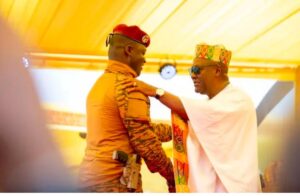Policy Analyst Raises Concerns Over Burkina Faso Leader’s Armed Presence at Mahama’s Inauguration.
 Emmanuel Bensah, a policy analyst with the Economic Community of West Africa Union (ECOWAU), has expressed concerns about the security protocol that permitted Burkina Faso’s President, Ibrahim Traoré, to carry a weapon during the inauguration of Ghana’s President John Dramani Mahama on January 7, 2025.
Emmanuel Bensah, a policy analyst with the Economic Community of West Africa Union (ECOWAU), has expressed concerns about the security protocol that permitted Burkina Faso’s President, Ibrahim Traoré, to carry a weapon during the inauguration of Ghana’s President John Dramani Mahama on January 7, 2025.
Speaking on the matter, Mr. Bensah described the incident as a significant security risk from a civilian perspective, highlighting the need for stricter measures to safeguard such high-profile events in the future.
Mr. Bensah explained that while diplomatic immunity and protocol considerations may apply, the sight of a sitting head of state armed at a public event creates an unnecessary security risk. “It was unusual and raises critical questions about the enforcement of security protocols at events of such magnitude,” he noted.
He added that allowing firearms at a highly publicized ceremony, attended by dignitaries and global representatives, could have had dire consequences if the situation had escalated.
The policy analyst urged the relevant security agencies to reassess their procedures to ensure that similar occurrences are avoided in the future. He stressed that global norms for state functions generally prohibit the possession of weapons, especially by guests, to guarantee a safe and conducive environment.
There is a need for stricter measures to ensure safety at similar events,” Mr. Bensah said. He also emphasized that protocols should be uniformly applied to all attendees, regardless of their status, to maintain fairness and eliminate potential security threats.
While acknowledging the unique security concerns of leaders like President Traoré, who governs a country grappling with instability and threats, Mr. Bensah argued that these should not override the collective safety of other attendees. He advocated for open dialogue between security agencies and diplomatic entities to strike a balance between protecting individual leaders and ensuring public safety.
The incident has sparked conversations about the enforcement of security measures at high-profile state events in Ghana and beyond. Analysts and observers agree that lessons must be learned to refine protocols and prevent potential risks at future ceremonies.
Emmanuel Bensah’s critique serves as a wake-up call for security agencies and event organizers to prioritize the safety of all participants at state functions. As Ghana continues to host prominent global events, ensuring robust and fair security protocols will be critical in maintaining its reputation as a beacon of peace and democracy in West Africa.


